Top 5 Court Transcription Services for Legal Professionals
- Benefits of Using Court Transcriber Software
- Exploring the 5 Reliable Court Transcriber Tools [Pros & Cons]
Benefits of Using Court Transcriber Software
As mentioned earlier, a court transcriber tool can accurately convert legal-related spoken dialogue or discussion into written transcripts. This is made possible by its advanced AI technology, which provides users with not only a high level of accuracy but also efficiency, speed, and more. In addition to these, here’s a list of benefits you can get from using the best legal transcription software:
1. Saves Time & Speeds Up Workflow – A transcriber tool can automatically convert spoken words into text, helping legal professionals avoid spending excessive time on manual transcriptions. This tool helps them accelerate documentation and meet tight deadlines more efficiently.
2. Improves Accuracy – In addition to saving time, the transcriber tool uses advanced speech recognition and AI to capture legal terminology and discussions more accurately than manual transcription. This helps reduce errors and minimizes the need for constant corrections.
3. Cost-Effective – Instead of hiring an expensive transcriber or outsourcing services, you can use more affordable software.
4. Easier Search & Review – When spoken legal discussions are transcribed into text, reviewing them for specific information, such as names, dates, or keywords, becomes much easier.
5. Secure & Confidential – Most transcription tools include built-in security features to ensure that sensitive or confidential information remains protected.
Exploring the 5 Reliable Court Transcriber Tools [Pros & Cons]
Now that you’ve explored the benefits of using a court transcriber tool, here are this post’s top five tool recommendations for transcribing legal-related discussions. Explore each of them and identify which one will work best for you and match your preferences.
1. RecCloud
The first legal transcription software this post recommends is the professional RecCloud. This multi-platform tool comes with a Free Online AI Speech to Text feature that uses advanced speech recognition technology. It accurately captures and transcribes legal conversations in multiple languages, turning them into clean, editable, and easy-to-read text. It’s built-in summarization feature adds value by pulling out the key points, so you don’t have to sift through long transcripts. It also includes an AI chatbot that can help explain tricky legal terms or flag sections that might need a second look. If you’re dealing with sensitive or confidential material, the tool uses strict, regularly updated encryption to keep your files secure and ensure that nothing is shared with third parties.
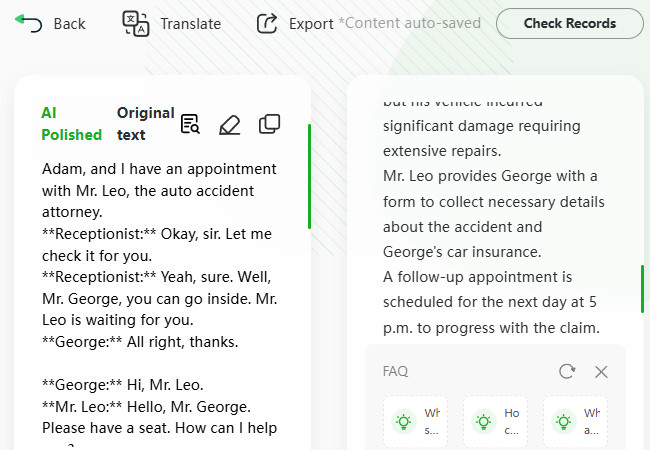
Pros
- Intuitive court transcriber tool with easy-to-use features.
- Accurately turns spoken legal-related conversations into text with identified speakers.
- Supports the find feature, which you can use to find specific data.
- Secures transcriptions, recordings, and imported media files.
- Auto-saves transcriptions to the cloud, which you can access anytime and anywhere.
Cons
- Payable upgrade to fully experience the tool.
2. Otter.ai
If you’re looking for a court transcriber tool that can initiate audio transcription for online legal-related discussions or conversations, Otter.ai is a great option. This tool automatically integrates with various video conferencing platforms, like Zoom, Google Meet, and Microsoft Teams, to take notes or generate transcriptions. Additionally, it automatically generates a 30-second summary of your online legal-related discussions for you to track important details easily. Moreover, it can also automatically create action items for you to quickly locate what needs to be done next, prioritize tasks, and allocate responsibilities.
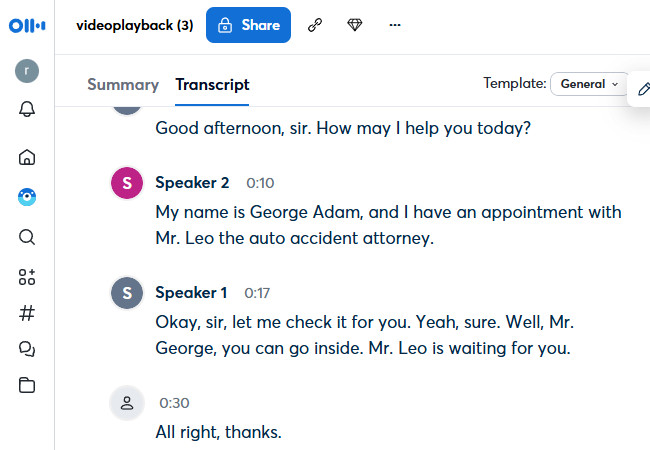
Pros
- Easy-to-understand interface.
- Transcribes live legal-related discussions.
- Turn spoken speech into text with identified speakers.
- You can easily find names, dates, and other data.
- Allows you to make your transcriptions private and secure.
Cons
- Poor transcription accuracy for complex legal terminology.
- Only lets you import 3 recorded files for free.
- Expensive tool compared to the others.
3. Descript
Another tool you can use to initiate an audio transcription for court or other legal-related conversations is Descript. This tool is not only capable of transcribing video or audio-recorded files but also allows you to transcribe real-time conversations through its built-in screen and audio recording features. It transcribes legal-related conversations or discussions with speaker labels and timestamps. Additionally, it supports media editing features, which are useful when reviewing audio or video-recorded files. You can use them to trim irrelevant parts or correct misstatements.
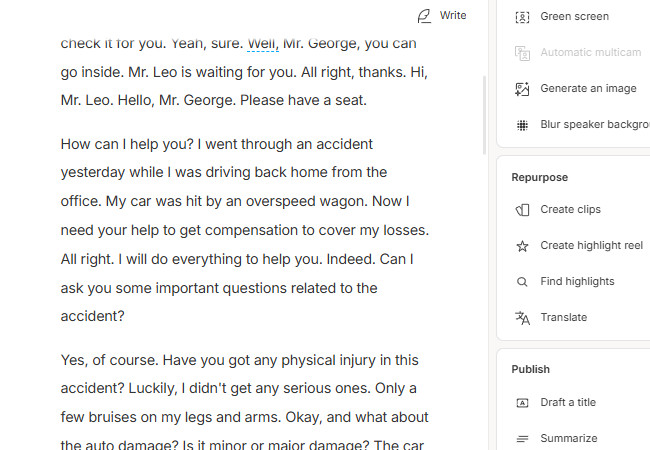
Pros
- Supports an intuitive interface with easy-to-initiate transcription.
- It lets you translate transcribed text and create a post for it.
- A great tool for streamlining workflow in a law firm or legal media setting.
- Offers a variety of output formats, including TXT, DOCX, HTML, etc.
Cons
- Other features are quite overwhelming.
- It requires manual corrections for complex legal terms.
4. Trint
If you prefer to use a court transcriber tool that doesn’t have too many features and offers a straightforward way to turn legal-related conversations into text, then you should try Trint. This tool doesn’t offer too many features, but it is more than enough to transcribe legal-related discussions efficiently and accurately. It transcribes spoken words with labeled speakers and timestamps. Additionally, it supports a find-and-replace feature, which you can use to search for various data, such as names and dates, within the transcribed text. Moreover, if you are working with a legal team, this tool includes collaboration features. Furthermore, what makes this tool different from the rest is that it lets you export only the highlights of the transcribed text. This will save time and help you focus on the most important parts of a legal conversation.
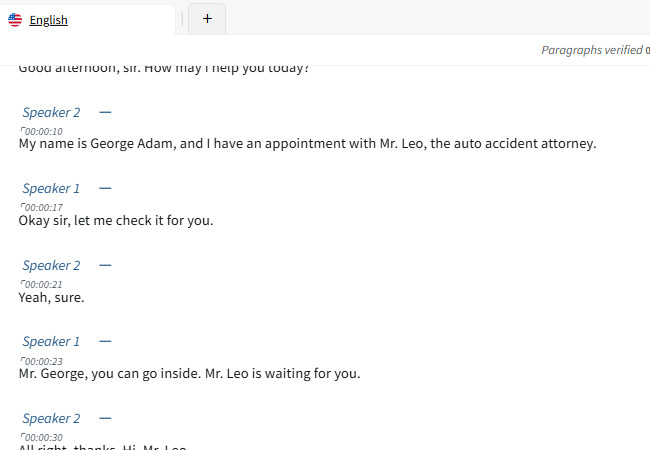
Pros
- Uncomplicated tool to use.
- Allows you to control who can access the transcriptions.
- Enables you to customize the generated summary’s format and length.
- Lets you translate transcribed text to various languages, such as Chinese, French, German, etc.
Cons
- Slow transcribing speed.
- Provides limited AI-powered features compared to other tools.
- Offers too limited transcription service under its free version.
5. Verbit
The last court transcriber tool this post would like to recommend is Verbit. This tool combines advanced AI technology with human review to provide highly accurate, real-time transcriptions of various legal-related conversations, such as hearings and depositions. With features like speaker identification, timestamping, and the ability to handle complex legal terminology, this tool ensures that every detail is captured. Additionally, it supports robust security measures, making it a reliable choice for handling sensitive legal data. Similarly, like Otter.ai, this tool can also be integrated with video conferencing platforms like Zoom and Google Drive. This provides seamless workflow management, which is essential for courts, law firms, and legal teams.
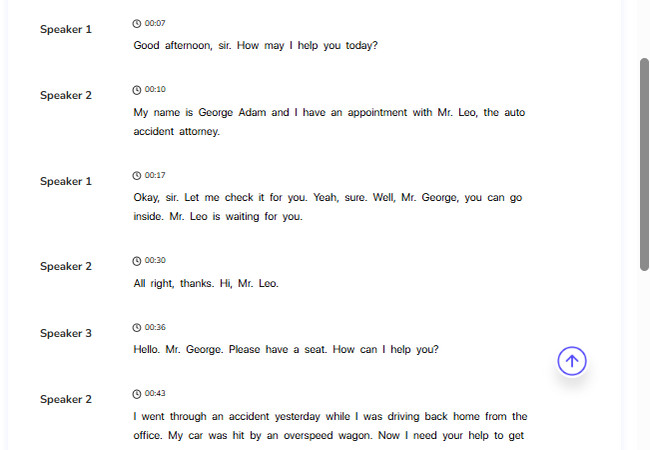
Pros
- It offers a variety of formats to export your transcriptions.
- Provides a great level of transcription accuracy.
- Transcribe legal-related conversations with the speaker and timestamps.
- Gives you a secure transcription operation and delivers real-time transcripts.
Cons
- Takes a lot of time to transcribe legal-related conversations.
- Not the cheapest on the list.
- Offers too limited features under the free trial.
Conclusion
To sum up, this post features the five best court transcriber tools you can use to efficiently and accurately convert legal-related spoken dialogues or discussions into written transcripts. With these tools, you can easily create text-based records of your conversations without the need to transcribe them one by one manually. So, what are you waiting for? Explore all the tools and see their differences and functionalities for yourself.






Leave a Comment